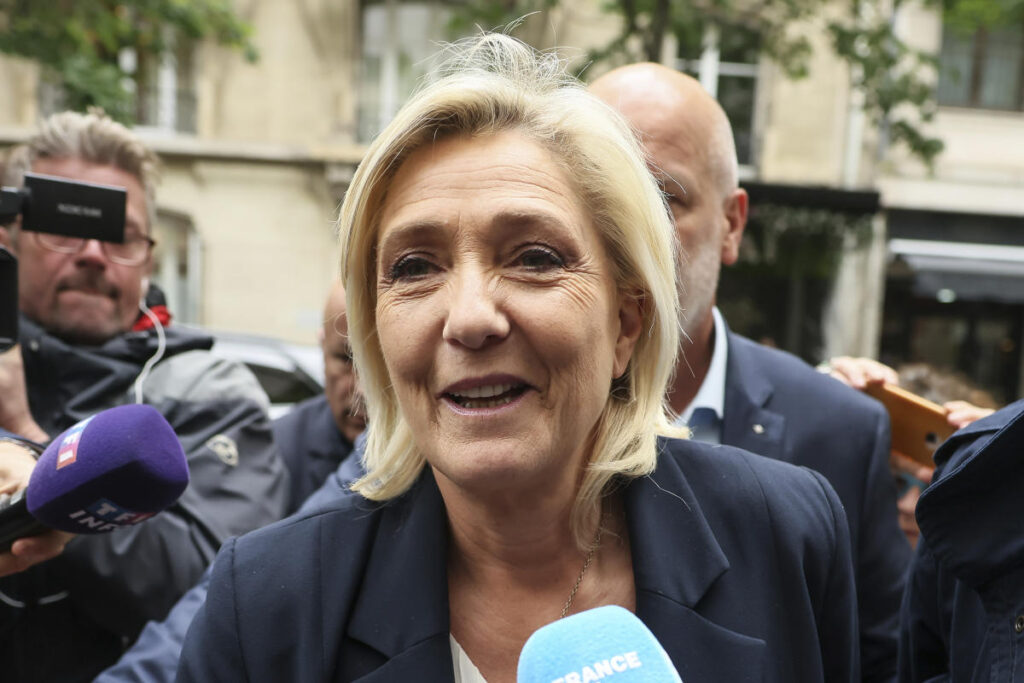The rise of the extreme right in France elections for the European Parliament was widely expected. What came next was not.
French President Emmanuel Macron so-called early parliamentary electionsHe said he could not ignore the new political reality after his pro-European party suffered a cleansing defeat and was expected to receive less than half the support of Marine Le Pen’s National Rally.
He hopes that voters will unite to somehow curb the far right in national elections they didn’t do that in European ones.
But Sunday’s decision to dissolve parliament and send to the polls voters who have just expressed their dissatisfaction with Macron’s policies was a risky move that could lead to France’s far right gaining its first government will lead.
Macron, who did There are still three years left in his second and final presidential termwould then have to find a way to work with a prime minister from a party deeply opposed to most of his policies.
Here’s a look at the reasons behind the move.
How did French voters cast their votes?
The far-right National Rally is led by a 28-year-old Jordan Bardellais expected to win the most French seats in the European Parliament, possibly even 30 of France’s 81, with a preliminary count showing them with more than 30% of the French vote.
That would be the culmination of one rebranding campaign who wanted to appeal to moderate voters after decades of racist, anti-Semitic statements by leaders of the party then known as the National Front.
Macron’s Renaissance Party has less than 15%, according to the latest estimates – just ahead of the Socialists, who the French president thought had managed to disappear from the political scene when he was first elected president in 2017 .
The left-wing France Unbowed party could end up in fourth place with around 10% of the vote, and the conservative Républicains around 7%.
Why did Macron call French elections?
Macron’s centrist party was the largest in the National Assembly, parliament’s lower house, although it lost its majority in 2022, forcing lawmakers to work with politicians from the left and right to pass bills.
In light of the landslide victory of the far right in the European elections, Macron called the election because otherwise he feared the results would paralyze the legislature and leave him a lame duck leader three years before the next presidential election in 2027, his advisers said.
National Assembly President Yaël Braun-Pivet also said the president wanted to show he was responsive to voters. “We are told too often that we do not hear, that we are cut off from the people, and that is where the president has made a decision after a very clear vote from the French,” Braun-Pivet said on Monday.
What are the risks?
French Foreign Minister Stéphane Séjourné said Macron’s decision to call elections is not a “poker move”. But now that the left is deeply divided and millions of voters no longer fear National Rally’s policies, it appears that betting on a popular wave against the far right three weeks before the election is a high-stakes bid.
The National Rally, with his anti-immigration agenda, is now well established and represents the largest parliamentary opposition group in the lower house of parliament. Le Pen reached the second round of the presidential elections twice, after her father Jean-Marie Le Pen did so in 2002. The normalization strategy has paid off and the party has gone mainstream, developing a strong network of officials across France.
Can Macron trust the left to help him?
The two-round system for general elections has historically made it difficult for extremist parties to gain ground, as mainstream parties band together to isolate those on the fringes. But that strategy may not work this time. In the last general election, Le Pen’s National Rally won more than ten times as many seats as it did five years earlier.
Far-left politician Francois Ruffin called on all leaders of the left, including the Greens, to unite under one banner of the “Popular Front”. “To avoid the worst, to win,” he wrote on social platform X. Others on the left suggested a similar collaboration.
Yet Raphaël Glucksmann, the leading Socialist candidate, accused Macron of giving in to the National Rally’s calls for a dissolution of the National Assembly. He said the move “will remain a stain on Emmanuel Macron’s five-year, one more term in office,” and blamed the French president for what he sees as an “extremely dangerous” game.
Le Pen is riding high
Le Pen said she is “ready to change the country” after sending Macron into the ropes.
“We are ready to exercise power if the French people place their trust in us in these future parliamentary elections,” she told party supporters in Paris.
Le Pen has been the face of the National Rally for years. But at the European elections she took a step back and made way for Bardella. The chairman of Le Pen’s party has now led this party to the gates of power.
Bardella quickly rose to the top after honing his political skills as chairman of the party’s youth wing. Although he has been careful not to overshadow Le Pen, his popularity is growing rapidly, especially among young people.
During the campaign, Bardella was often treated to a rock star welcome, with swarms of screaming fans hoping for the chance to kiss him or leave with a selfie.
What’s next?
If another party, or a coalition, wins a majority of seats in the general election, Macron will be forced to appoint a prime minister from that new majority.
In such a situation – called “cohabitation” in France – the government would implement domestic policies that differ from the president’s plan. However, the French president would have a say in the country’s foreign and defense policy. Such an arrangement could make France virtually ungovernable.







